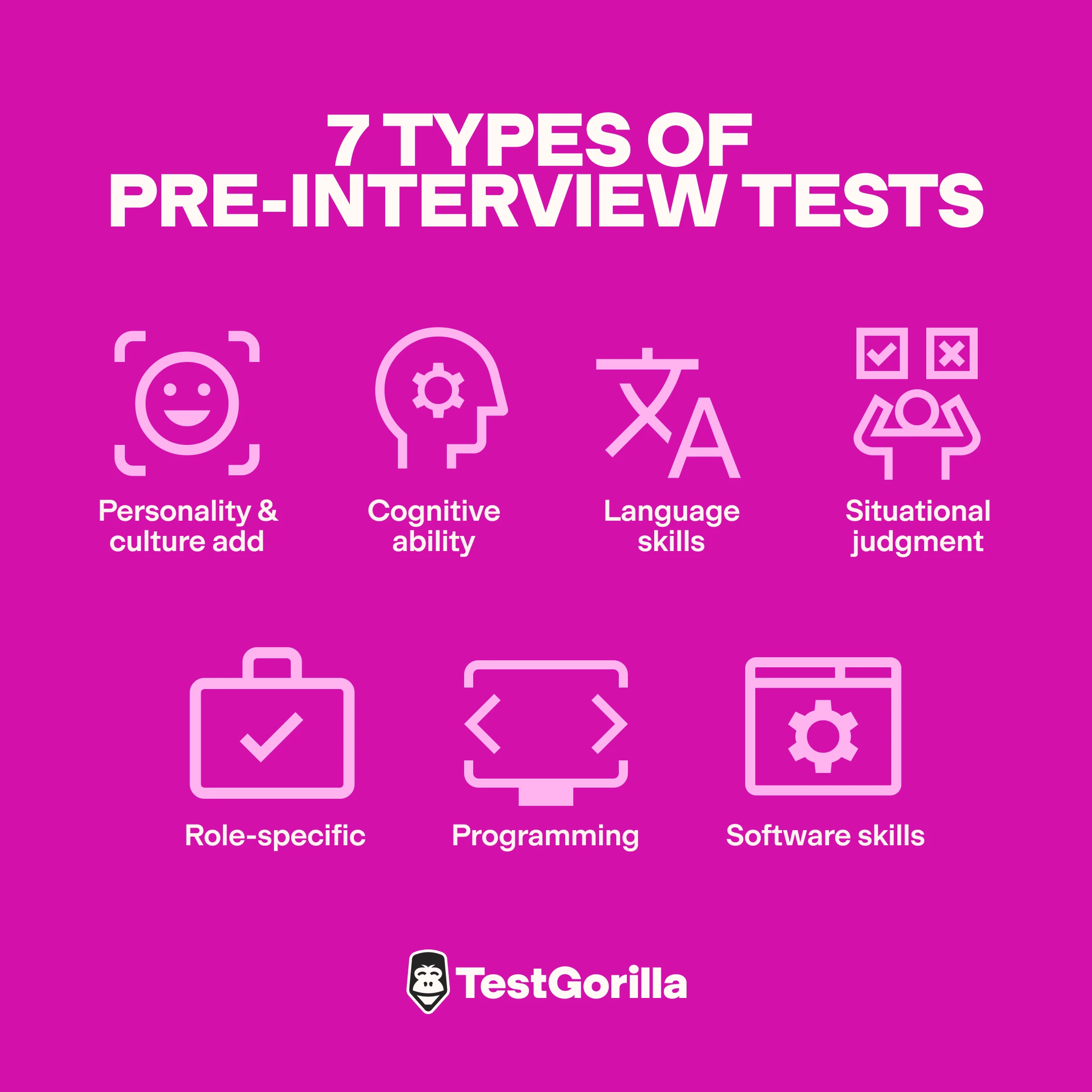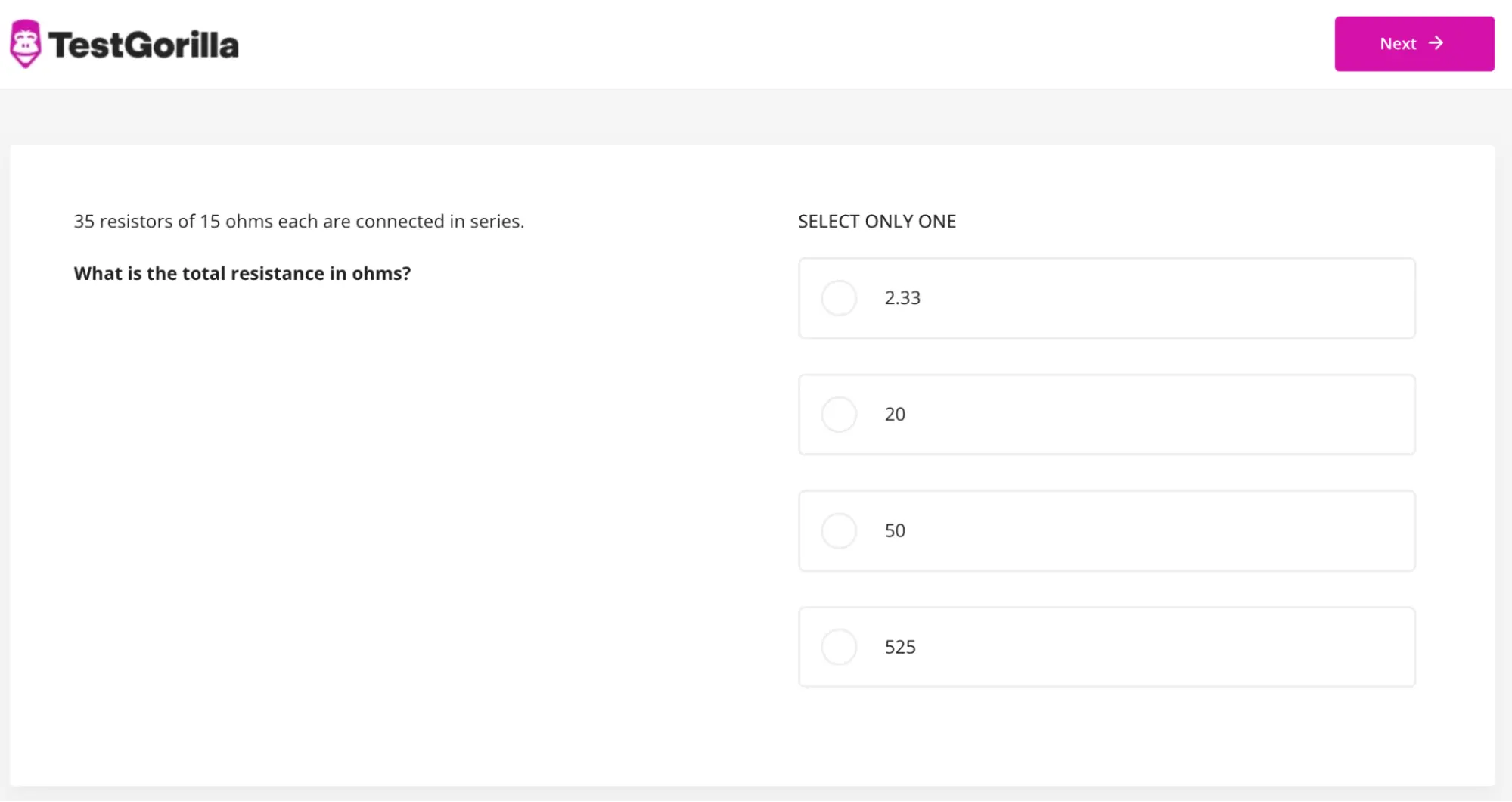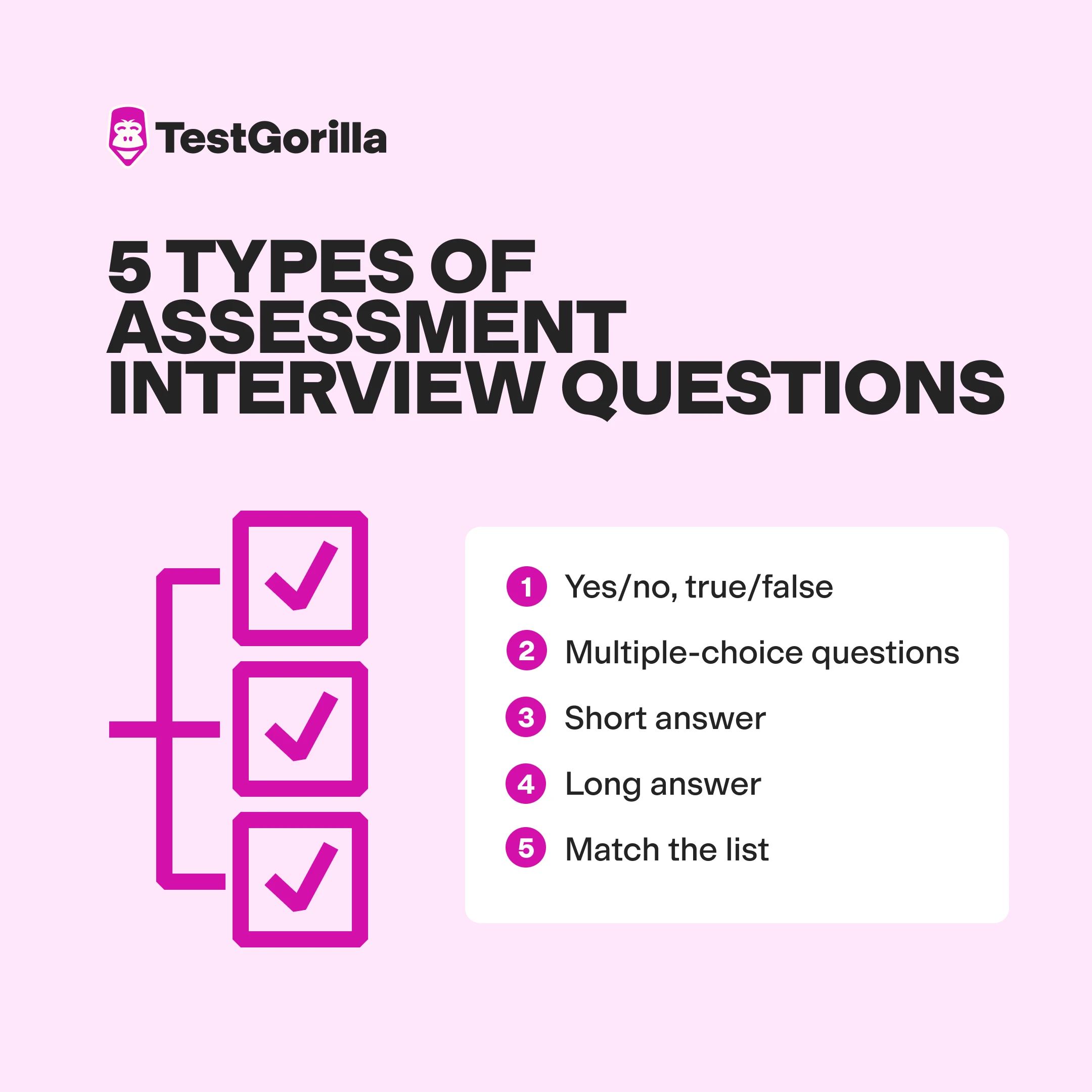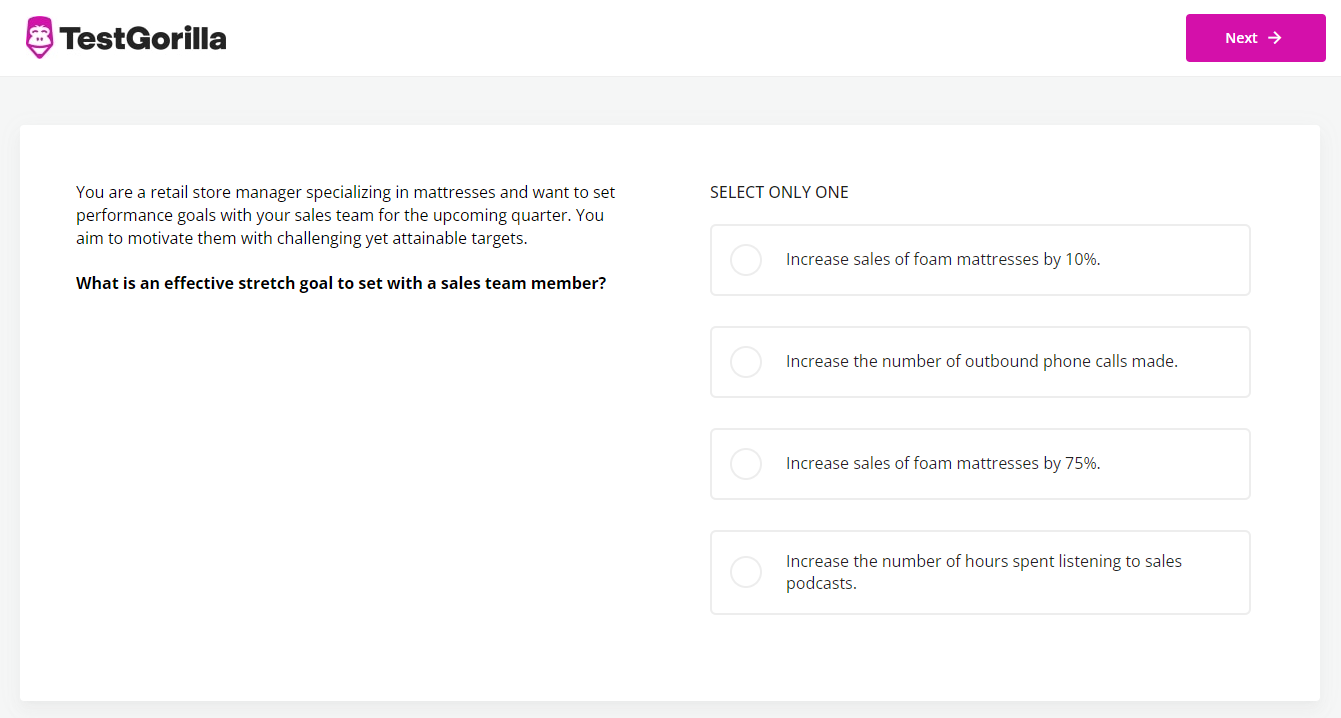7 types of interview assessments that companies should give candidates
Find the best talent without reading endless resumes
Job interviews should be about identifying the candidates that bring something extra to a role – not making sure they meet basic requirements.
Interview assessments give candidates a chance to prove their skills upfront, so you don’t have to worry about screening in the interview.
This speeds up shortlisting and enables you to focus on learning more about the candidate's attitude, experience, and ambitions for the role instead of checking their MySQL skills or other aptitudes listed on their resume.
Here’s how to use interview assessment tests to supercharge your recruitment process.
What are interview assessments?
Interview assessments are a method of testing applicants in the hiring process to see which should be invited to an interview.
Because job interviews require extensive preparation from both companies and candidates, interview assessments save both sides time by revealing candidates’ strengths and weaknesses upfront.
The main benefit of using interview assessments is that they remove unqualified applicants early in the hiring process and give hiring managers the chance to focus on the most suitable candidates.
Here are some of the other benefits of using pre-employment screening tests:
Benefit of interview assessments | Summary |
They save time | Human resources only interview candidates who performed well on relevant tests, indicating their skills match those mentioned in the job description. |
They provide a good candidate experience | Candidates no longer wonder why they weren’t invited for an interview and can even review their scores to see areas for improvement. |
They eliminate bias from the interview process | Skills assessments are objective and focus on demonstrable skills because you simply shortlist the candidates who scored the best. |
They make it harder for candidates to lie | One Checkster survey found that 78% of people had lied or thought about lying on their resumes. By contrast, interview assessments have anti-cheating measures in place, and directly test candidates’ skills instead of relying on their word for hiring decisions. |
They’re more accurate | Resumes rely on prior experience as an indicator of skill, but research shows this is a poor predictor of job performance or retention. Interview assessments directly test the skills candidates need to perform and maximize the chances of hiring a good fit. Orbit Technologies improved new hire retention by 50% by switching to TestGorilla. |
7 types of interview tests
Building pre-interview exams into your talent assessment framework instead of running screening tests in the interview saves time and gets better results.
Here are the seven types of interview assessment tests you should choose from:
1. Personality and culture add interview assessments
One of your top priorities when hiring should be protecting your company culture. Research shows a toxic culture is 10.4 times more powerful than compensation in predicting a company’s attrition rate.
Personality tests for interviews evaluate candidates’ personalities and culture add potential to see if they will fit into and add anything new to the company. These tests don’t measure technical skills but capture things like disposition, character, and values.
An excellent test is the 16 Types test, which provides insight into an individual’s decision-making process and what kind of lifestyle they prefer.
Other personality tests include:
Big 5 (OCEAN) test
DISC test
Culture Add test
Do this right and you could reap huge benefits. One study found that for each one-star improvement in employee satisfaction ratings, companies gained a 1.3-point out of 100 improvement in customer satisfaction scores.
2. Cognitive ability pre-interview assessments
Cognitive ability tests help hiring managers by assessing candidates’ reasoning, problem-solving, critical thinking, verbal, and numerical abilities.
These interview tests offer hiring managers insights into how candidates would deal with challenges and problems they may face on a daily basis in the organization.
An assessment like the Problem Solving test helps any hiring manager judge whether a job candidate can deal with workplace issues, while the Numerical Reasoning test reviews how the candidate applies basic math skills in real-life scenarios.
3. Language interview assessments
Using company tests can help you balance diversity with the commonalities Harvard research shows are necessary to avoid conflict – significantly, language fluency.
Language skills tests evaluate candidates in their speaking, writing, reading, and listening skills in a particular language, following the widely used CEFR (Common European Framework of Reference for Languages) scale.
The CEFR scale has six levels:
CEFR level | Description |
A1 | Beginner |
A2 | Elementary |
B1 | Lower intermediate |
B2 | Upper intermediate |
C1 | Proficiency (advanced level) |
C2 | Mastery over the language (native level) |
For instance, candidates applying to work with a market that predominantly speaks Mandarin should be proficient in that language. An interview exam ensures you can identify applicants who meet that requirement even if you yourself don’t speak that language.
4. Situational judgment interview assessments
Situational judgment tests provide hiring managers with the opportunity to see how candidates react in specific contexts and whether they can handle difficult situations properly.
Candidates are usually tested in situations involving high levels of stress and risk, business factors like leadership/management situations, and workplace ethics.
You can give your candidates the Business Ethics and Compliance test to see how they react to specific ethical issues that may come up in the business. Or you can assess their abilities to guide a discussion in a particular direction by giving them a Negotiation test.
Use TestGorilla to discover great talent
See how our situational judgment tests can identify the best candidates faster.
5. Role-specific skills interview assessments
Role-specific pre-interview tests evaluate the specific skills a candidate needs for a given role. Such skills are usually technical in nature and often require a high level of expertise or significant training and experience.
For example, you can ask a candidate applying for an electrician vacancy to take the Fundamentals of Electricity test to see if they have the necessary skills.
These kinds of aptitude tests can also evaluate theoretical knowledge, such as in the Bookkeeping test designed to evaluate accountants.
To see example bookkeeping questions, please click here.
6. Programming skills interview assessments
Programming pre-interview assessments evaluate how well your candidates know programming languages such as HTML5 (used for developing web applications) and if they can operate them to the expected level.
Programming skills are in high demand in today’s business environment, and it’s imperative that companies properly evaluate candidates for roles that require these competencies.
Some of the most used programming tests are for specific programming languages, such as:
PHP algorithms (used for web development)
Javascript
Python
7. Software skills interview assessments
Software pre-interview assessments evaluate candidates’ software skills.
These tests are different from programming skills because they test productivity and proprietary platforms, such as knowledge of different CRM solutions, MS Office tools, or advertising platforms like Facebook ads.
When hiring for an open role, it’s best to give your candidates a combination of different tests to get a more comprehensive evaluation of their skills. To create the perfect balance of tests, you should take a look at our article on the 7 test types you need for a strong interview test.
The best insights on HR and recruitment, delivered to your inbox.
Biweekly updates. No spam. Unsubscribe any time.
Example assessment interview question types
When including an online screening test in interview preparations, these are the types of questions you should include.
1. Yes/no, true/false
One of the most straightforward question types, these interview assessment questions focus on candidates’ knowledge of certain systems, processes, or best practices.
For example:
The best time to post on LinkedIn is always the same, regardless of audience. True or false?
The agile approach to project management focuses on continuous improvement and incorporating customer feedback. Yes or no?
If a business has not yet made a profit, you don’t need to include a financial plan in the business plan. True or false?
Alternatively, they could focus on the candidate’s personality or work mindset, presenting statements like: “The best way to learn is through trial and error.”
2. Multiple-choice questions
Multiple-choice questions ask candidates to select what they think are the correct answers. These questions can show you the depth of a candidate’s knowledge in a specific field because they should be able to find the right answer(s) even if there are many options to choose from.
Here’s an example from our Performance Management test:
Explore TestGorilla’s range of assessment questions, totally free.
Try out our interview assessment tests for yourself without paying a penny.
3. Short answer
Short answer questions usually require candidates to write a short phrase. Here, a candidate needs to be clear and concise to answer a question correctly.
For example, a marketer might get questions like:
What do you call a campaign that provides the clearest cost-to-revenue ratio on the Google platform?
What do the abbreviations CTR and CPC stand for?
What is a PPV campaign?
4. Long answer
Long answers ask candidates to write something more extended in response to a question. They usually start with phrases like “Describe a time when…” or “Tell me about…”
These questions present an opportunity for candidates to explain how they addressed a situation or a challenge. Examples of long answer questions include:
Describe a time when you solved a conflict between your team members in the workplace
Describe a time when you identified a personal weakness at work and took steps to improve it
Describe a time when you worked collaboratively as part of a team to reach a common goal at work
5. Match the list
Match the list questions usually have two sets of sentences or words, one on each side, and the candidate needs to match them (usually with a line).
For example, a candidate might see a list on the left-hand side with mathematical questions, and they need to match them with the correct answers from a list on the right.
Invite the best candidates to interview with TestGorilla interview assessments
In this article, we’ve covered what interview tests are and how they enable you to screen for qualified candidates without sifting through countless resumes.
We’ve also covered how to use different types of interview exam questions to find the qualities you’re looking for in a great hire.
Now, it’s over to you.
To find out how TestGorilla’s library of interview assessments could work for you, take a product tour or sign up for a demo today.
Or start optimizing your hiring process immediately by signing up for a Free forever plan and trying skills testing for yourself!
Interview assessment FAQs
Do you still have questions about testing interview candidates in the screening stage? Here are some common queries about interview tests.
What is an interview examination?
An interview assessment is a test, usually delivered online, that evaluates how your skills, abilities, and personality traits match up with the role you’ve applied for. They do this by asking you questions to directly test your skills – for example, an engineer might receive questions about their programming skills.
What is an assessment after an interview?
An assessment after an interview is used to help an employer gain deeper insight into a candidate’s skills and attributes. For example, in a pre-interview assessment, all candidates might be tested on basic software skills, with shortlisted candidates completing a coding test after the interview.
What kind of questions are asked in an assessment?
In an interview assessment test, candidates answer five main types of assessment interview questions:
Yes/ no, true/false
Multiple-choice
Short answer
Long answer
Match the list
You've scrolled this far
Why not try TestGorilla for free, and see what happens when you put skills first.






















